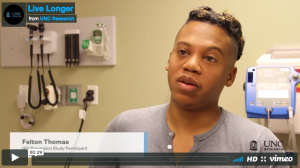The UNC Division of Infectious Diseases has launched three simultaneous studies to help prevent HIV within the most susceptible populations.

(Republished with permission from UNC’s Endeavors)
Social worker Michael Williams had never considered joining a research study, especially one to prevent HIV. But learning he was at risk prompted him to take control of his health. He is now participating in his fifth trial.
“Like a lot of people, I don’t like using condoms,” Williams says. “Then, my partner disclosed that he was living with HIV. He had an appointment at UNC’s Infectious Diseases Clinic the next day. We asked about our options while we were there and that is how we found out about a research study testing a pill called Truvada to prevent HIV. I’ve been on that now for at least four or five years, and I am still HIV negative.”

While the rate of new HIV infections in the United States has stabilized to around 40,000 annually, African-American gay men remain disproportionately affected. African Americans represented only 12 percent of the U.S. population in 2015, but accounted for 45 percent of new diagnoses, according to the Centers for Disease Control and Prevention (CDC). And even more startling, 82 percent of infections among men occurred in those who identified as gay or bisexual.
“Men who have sex with men are at higher risk for infection. Anal sex is the most efficient means of transmitting HIV sexually,” Christopher Hurt, a UNC infectious diseases specialist and researcher, says.
To ready the full article, please visit Endeavors.